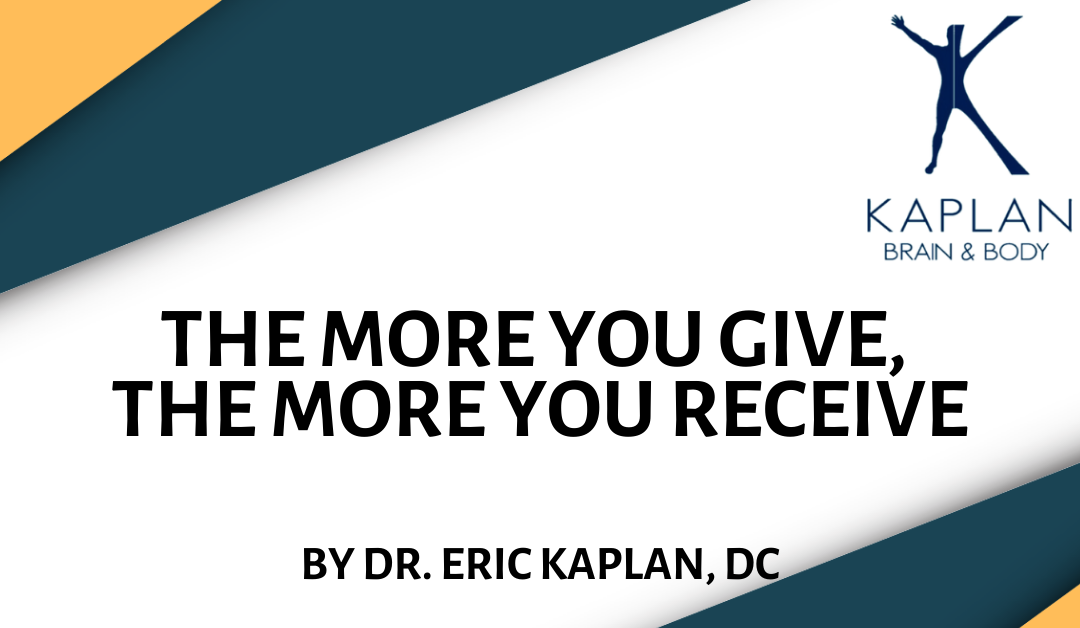At the end of an appointment, I always ask my patients if they have any questions. One question I get occasionally, usually said in a joking manner, is, “What is the meaning of life?” I always respond the same way, “The meaning of life is to help other people and the planet.” It’s important to stop worrying or complaining about your life and to start helping people. Preliminary results from two Yale University studies have shown that people who harbor a lot of negativity, anger, and complaints are more likely to get Alzheimer’s. If you start helping other people, you will boost your brainpower, thereby improving mood, memory, focus, and motivation. Go into every situation in life thinking of ways to help people. Maybe you can offer somebody a ride home, take out somebody’s garbage, put someone’s bag in the overhead compartment on an airplane, help someone move, drop someone off at the airport, or walk someone’s dog for them. These are just a few ideas, but you get the gist.
I have noticed that people who complain the most tend to watch the news and use social media more frequently. Please don’t waste your life watching TV and playing on the internet when you could instead be improving someone’s day and improving your brain function. The news is designed to shock and upset people, drawing them in to watch more by emphasizing drama and fear. Social media is largely a collection of people sharing the positive or exciting parts of their lives. These posts can make you feel like your life has more conflict or negativity than your friends and family, but this is an illusion. Everyone faces some degree of trouble or suffering in their lives. Perform an experiment: stop watching the news and using social media for two weeks, and see how much better you feel.
Service is a great way to use your energy positively to help your community. Even if you have no money, you can make a change. When I was in college at Emory University, for instance, many people participated in a program called Habitat for Humanity, where college students help the less fortunate by building them houses. When I was in chiropractic school, many students would go to foreign countries on mission trips to give chiropractic adjustments to children and adults in need of care. These students adjusted hundreds of people a day and helped them with a variety of health problems. Volunteer initiatives are great ways to give back, help others, and build community. You can even get involved in organizing service trips at a local temple, church, or community center. Your time and talents can make a difference in someone’s life.
If you are fortunate enough to have money to give to charity, remember that even a little can make a big difference in countries where resources are scarce. In many developing nations, people do not have ready access to clothes, shoes, or socks. Families in these countries cannot afford books, pencils, or paper, and sending their children to school is a huge financial hardship. Some hospitals in remote areas cannot afford scalpels, knives, and bandages. There are delivery services that provide large boxes with affordable shipping rates, thereby making it possible to buy many of these much-needed supplies at a dollar store and send them to little communities around the world for as little as a hundred dollars.
But remember, you do not need money to help people. If you know a lot about cars, help someone change a flat tire. If you are strong, help someone move heavy boxes. If someone is struggling with parking their car, offer your assistance. If someone is lost, give them directions. Or find something that you are passionate about and help people in your own way. Simply performing little acts of kindness every day can help. Whether it’s opening the door for someone, picking up something that someone dropped, letting someone cut in front of you in line, walking an elderly woman across the street, or donating old clothes and shoes to the less fortunate, this action will create a “pay it forward” mentality that will help change your communities in positive ways. The less you complain and the more you give, the better your brain will function.
If you or someone you know are interested in learning more about boosting your brainpower without drugs, surgery, injections, supplements, or herbs, please purchase my new book, Boost Your Brainpower: A Guide to Improving Your Memory & Focus. What better gift to give yourself and others this holiday season than the gift of health! Visit www.kaplandc.com/holidayspecial to purchase your copy for 50% off (usually $20 – now only $10.) Offer valid through the end of the year.

